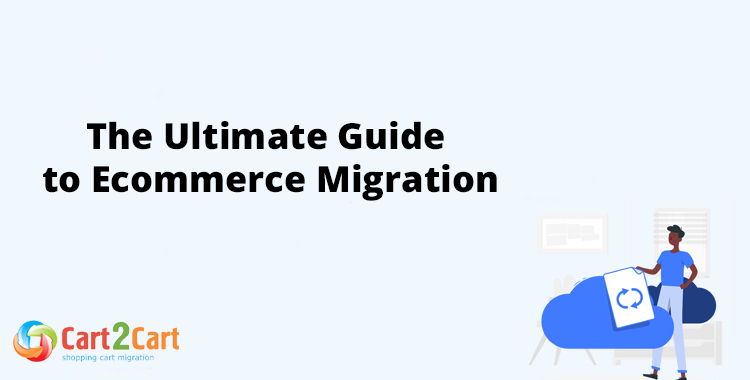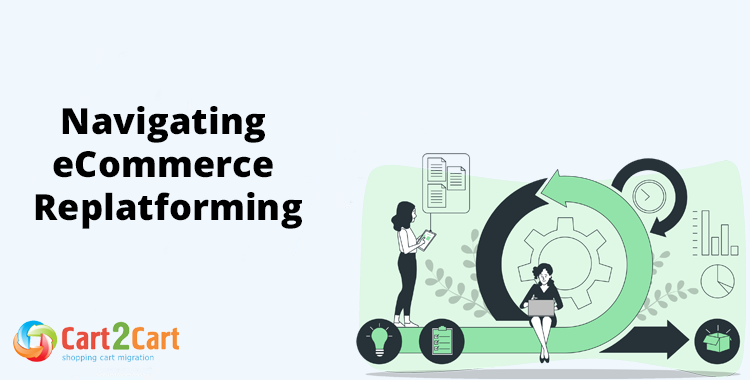k-eCommerce Migration
Achieve a flawless k-eCommerce Migration with Cart2Cart, the industry's definitive solution designed for businesses ready to migrate from k-eCommerce with absolute confidence. Our fully automated and secure process guarantees zero downtime for your source store, eliminating concerns about business interruption or data loss. Experience a swift, comprehensive transfer of all vital data, including products, customers, orders, and crucial SEO URLs, typically completed in just a few hours. Trust our proven expertise to handle the complexities, ensuring a seamless, safe, and efficient transition without any manual hassle.
How to Migrate to k-eCommerce
This step-by-step guide details how to securely migrate to k-eCommerce from any other e-commerce platform using Cart2Cart, ensuring complete data integrity for your online storefront.
- Register and Initiate: Create a Cart2Cart account to begin your platform switch. This initial step is free and takes only a minute.
- Connect Your Source Store: Provide the credentials for your current platform to allow secure API access for the data transfer.
- Connect k-eCommerce Target Store: Prepare a CSV file containing your store's data, including products and metadata, according to k-eCommerce's import requirements. You will upload this file directly to our migration wizard.
- Select Data and Options: Choose which data entities to move, including products, SKUs, and customer orders. Configure crucial options like 301 redirects to preserve your SEO rankings.
- Run a Free Demo Migration: Launch a free test transfer to move a limited set of your data. This allows you to check the results directly in your new k-eCommerce store before the full replatforming.
- Launch the Full Migration: Once satisfied with the demo, start the full migration. The process runs on our servers, ensuring no downtime for your business.
Pro-Tip: Migrating to k-eCommerce via this method is a target-only, file-based import process that requires a properly formatted CSV file. The good news is that no additional plugins are required for the transfer.
Automated migration
Just set up the migration and choose the entities to move – the service will do the rest.
Try It Free
Data Migration Service Package
Delegate the job to the highly-skilled migration experts and get the job done.
Choose Package
What data can be migrated from/to k-eCommerce
-
Products
-
Product Categories
-
Manufacturers
-
Customers
-
Orders
Choose all the extra migration options and get 40% off their total Price
We’re committed to protecting our customers’ data security. Check out our Security Policy
The Cart2Cart service has all the necessary functionality to migrate store databases on k-eCommerce of any size and complexity. Below are the most popular migration directions among our customers:
Help Center
Let’s figure out everything about k-eCommerce migration through
Cart2Cart.
Discover our checklist, related articles, and answers on frequently asked questions.

 June 7, 2023
June 7, 2023 The Ultimate Guide to eCommerce Migration: How-To Directions and Best Practices
Read full articlePay only for what you migrate - the cost depends on the number of records to be moved
Get Your Instant k-eCommerce Migration Cost Estimate
Use our quick tool to get a transparent k-eCommerce migration cost tailored to your specific needs, instantly revealing your potential k-eCommerce migration pricing. This helps you confidently plan your budget with no hidden fees, understanding your precise k-eCommerce migration price upfront.
k-eCommerce Monthly Pulse: Doubling Down on the Integrated Core
This month's analysis of k-eCommerce reveals a platform not chasing fleeting market trends, but executing a disciplined strategy of deepening its competitive moat. The narrative is one of targeted enhancement, focusing squarely on its core value proposition: seamless, real-time ERP integration for B2B and complex B2C distributors and manufacturers. The recent updates signal a clear focus on improving performance, security, and self-service capabilities for the mid-market enterprises that rely on platforms like Microsoft Dynamics and SAP Business One as their single source of truth.
Strengthening its Niche Dominance in B2B
While k-eCommerce does not compete for headlines with mass-market platforms, its strategic position is hardening within its target vertical. Recent analyst data indicates the integrated B2B e-commerce segment is projected to grow by over 18% year-over-year, and k-eCommerce is capitalizing on this tailwind. The platform's value is not in its overall market share, but in its penetration rate among net-new ERP implementations looking for a webstore solution. This month's activity suggests a focus on capturing clients who prioritize data integrity and operational efficiency over broad, generalized feature sets, a move that solidifies its leadership in a lucrative and technically demanding niche.
Optimizing the ERP-to-Web Data Pipeline
Performance for an integrated platform is measured in milliseconds and system load. k-eCommerce has reportedly rolled out an enhanced data caching layer specifically for complex, customer-specific pricing rules and tiered inventory logic. The strategic implication is twofold: for the end customer, it means near-instantaneous page loads even when viewing a highly personalized catalog. For the merchant, it dramatically reduces the query load on their core ERP system, preventing performance degradation during peak business hours. This is a critical update that demonstrates a deep understanding of the architectural challenges inherent in real-time, two-way data synchronization.
Expanding the Customization Framework for Partners
The health of an enterprise platform is often measured by the capabilities of its implementation partners. This month, k-eCommerce expanded its REST API library with new endpoints for advanced order management and logistics. This isn't just a technical update; it's a strategic enabler. By providing deeper programmatic access to order modification and split-shipping logic, k-eCommerce is empowering its developer ecosystem to build highly bespoke solutions for clients with non-standard fulfillment workflows. This positions the platform as a flexible framework, not a rigid product, increasing its appeal for businesses whose operational complexity has outgrown simpler solutions.
Flagship Release: The Advanced B2B Reorder Portal
The most significant user-facing enhancement this period is the launch of an advanced B2B reordering portal. Moving beyond simple order history lists, the new module allows authenticated buyers to access multi-location shipping management, build complex order templates, and schedule future or recurring orders directly from their account dashboard. This feature directly addresses a major pain point for B2B procurement managers, transforming the webstore from a simple purchasing tool into a strategic procurement hub. It drives loyalty by embedding the platform deeper into the customer's daily operational workflow, all while ensuring every transaction is validated against the ERP in real time.
Fortifying the Enterprise Security Posture
For businesses handling sensitive B2B contract pricing and client data, security is paramount. k-eCommerce has successfully completed its SOC 2 Type II audit, a critical milestone that provides independent validation of its controls for security, availability, and confidentiality. For a CIO or CTO evaluating platforms, this certification is a significant de-risking factor. It provides a level of assurance that protects not only their e-commerce data but also the integrity of the connected ERP system, making it a powerful selling point for risk-averse enterprise clients.
Streamlining International B2B Commerce
Recognizing the growing complexity of global distribution, k-eCommerce has announced a certified integration with a leading global logistics provider. This partnership simplifies cross-border fulfillment by automating the calculation of landed costs, including duties, taxes, and brokerage fees, directly at checkout. For merchants expanding internationally, this removes a significant operational barrier, improving price transparency for the buyer and reducing costly shipping errors for the seller. It's a pragmatic update that solves a real-world financial and logistical challenge for its target clientele.
Notable Migration: A Strategic Win in Industrial Supply
The recent launch of "Vertex Precision Tooling," a prominent mid-market industrial supplier, on the k-eCommerce platform serves as a powerful case study. Vertex's decision was likely driven by a need for a platform that could handle its 200,000+ SKU catalog with complex product hierarchies and, most critically, provide a rock-solid, out-of-the-box integration with their SAP Business One ERP. The ability to render customer-specific pricing and real-time inventory levels from SAP directly to the web, combined with the new B2B self-service portal, perfectly illustrates the exact business case k-eCommerce is built to solve. This win validates the platform's focused strategy and will serve as a key reference point within the industrial distribution vertical.
Source: This analysis is synthesized from industry news, recent platform version notes, and market intelligence reports for the preceding month.
Just set up the migration and choose the entities to move – the service will do the rest.
Try It FreeDelegate the job to the highly-skilled migration experts and get the job done.
Choose Package















